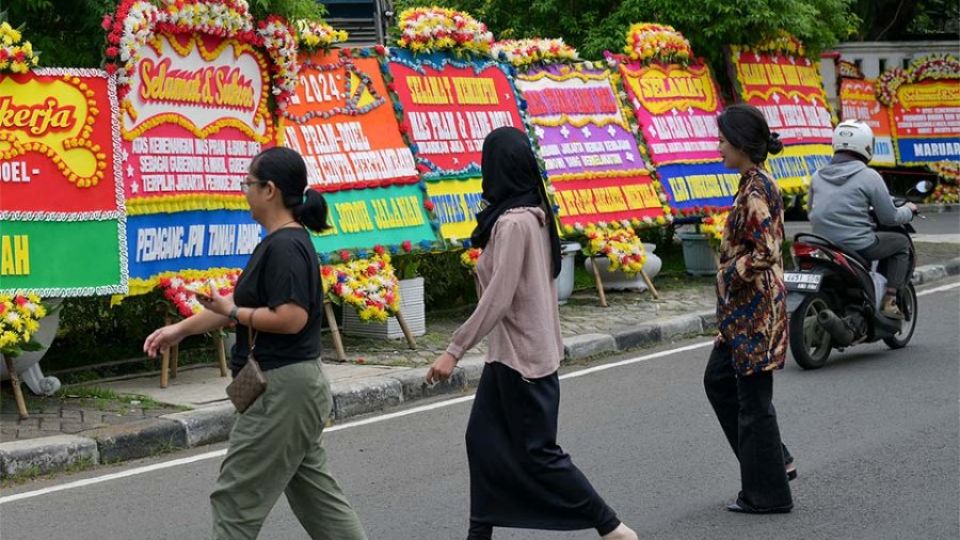January 10, 2025
JAKARTA – Jakarta is welcoming its new leaders after the local office of the General Elections Commission (KPU) confirmed on Thursday the victory of Pramono Anung and Rano Karno of the Indonesian Democratic Party of Struggle (PDI-P) in the November 2024 gubernatorial race.
Losing candidate Ridwan Kamil did not attend the certification ceremony, but the presence of independent candidate pair Dharma Pongrekun and Kun Wardana, as well as Ridwan’s running mate Suswono of the Prosperous Justice Party (PKS), was enough to send a signal that the incoming Jakarta leaders will govern with full legitimacy.
After all, the losing candidates decided not to contest the election results at the Constitutional Court, even though they had initially complained about the KPU’s lack of professionalism, which they claimed contributed to the lowest voter turnout in the history of Jakarta’s gubernatorial races. Only 57 percent of the city’s 8.2 million registered voters cast their ballots on Nov. 27.
Last month, the poll body declared that the Pramono-Rano pair won 50.07 percent of the total vote, followed by Ridwan and Suswono with 39.4 percent and Dharma and Kun with 10.53 percent.
Despite his absence, Ridwan, a former West Java governor whose candidacy was backed by President Prabowo Subianto’s big-tent Indonesia Onward Coalition (KIM), sent his regards to the winning pair and expressed hope that the new leaders would accommodate the various aspirations of Jakartans, including those who did not vote for them.
The victory of the PDI-P, the only de facto opposition to Prabowo’s administration, in Jakarta was widely viewed as an outlier in the regional head elections, the majority of which were won by KIM-backed candidates.
But, more than that, it also came as a ray of hope for Indonesia’s declining democracy amid the dominance of the entrenched ruling coalition now called KIM-plus following the additions of several parties ahead the regional polls.
Following Thursday’s certification ceremony, Jakartans can now ask Pramono and Rano to work double-time to tackle the perennial problems facing the city of over 11 million people.
Although Jakarta lost its national capital status with the issuance of a presidential decree (Keppres) last month, its many problems persist.
The metropolis consistently tops the list of the world’s most congested cities, with the Inrix 2024 Global Traffic Scorecard ranking the city 7th after Istanbul, New York, Chicago, Mexico, London and Paris.
The study further noted worsening traffic conditions, as the average Jakartan lost 89 hours driving through the city’s congested roads last year, some 24 hours more than the year before.
The current development of public transportation infrastructure, including the second phase of the Jakarta MRT North-South Line, is still considered insufficient to accommodate the city’s more than 3 million daily commuters.
A mere 91,000 people used the MRT line last year, while a large share of commuters used the far cheaper service provided by TransJakarta bus rapid transit (BRT).
The city’s Transportation Agency, however, has recently been considering removing one of TransJakarta’s busiest corridors, stretching from Blok M in South Jakarta to Kota in North Jakarta, because it overlaps with the MRT line, sparking public criticism.
Jakarta’s new leaders must acknowledge the urgent need for wider public transportation services that cater to the needs of all levels of society. Instead of removing the existing and properly run bus route, the city administration has to improve the BRT’s connectivity to accommodate more commuters and eventually reduce the use of private vehicles.
In addition to its notorious traffic jams, Jakarta is also infamous for its air pollution, unaddressed waste problems and lack of access to clean water. Previous administrations have tried their luck at tackling each one of these issues, although the results have been minimal in certain sectors.
However, Jakarta did see some significant improvements in the past decades, with each governor leaving a positive legacy. We eagerly await Pramono’s contributions to the city.


